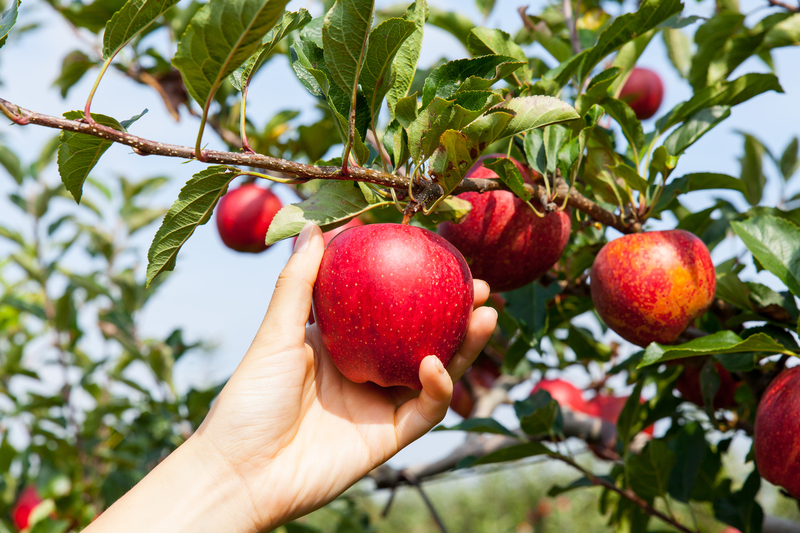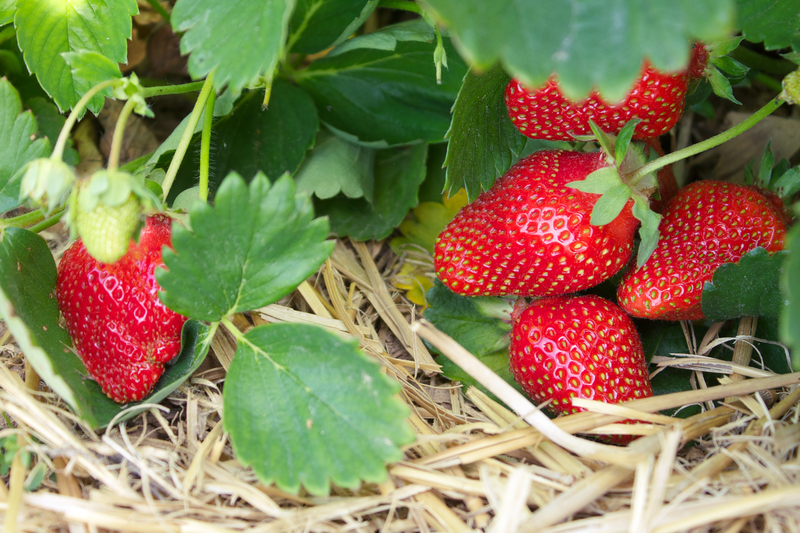Three Key Tips to Stay Ahead of Garden Weeds
Posted on 09/06/2025
Three Key Tips to Stay Ahead of Garden Weeds
Maintaining a thriving, healthy garden can be deeply rewarding, but one persistent challenge stands in the way of every gardener: weeds. These unwelcome plants not only compete for essential resources like water, nutrients, and sunlight but can also harbor pests and diseases. Fortunately, by arming yourself with the right strategies, you can stay ahead of weeds in your garden and cultivate strong, flourishing plants.
In this comprehensive guide, we'll explore three crucial tips to outsmart garden weeds and keep your landscape looking its absolute best. Whether you're a seasoned gardener or just starting, these weed prevention methods will help you enjoy a vibrant, weed-free yard.

Understanding Why Garden Weeds Thrive
Before diving into the top garden weed control tips, it's helpful to understand why weeds are so persistent. Weeds are opportunistic plants. They often have fast-growing roots, prolific seed production, and a remarkable ability to adapt to harsh conditions. Learning what attracts weeds to your garden--bare soil, water run-off, or unhealthy plants--can help you develop a garden maintenance routine that minimizes their presence.
Tip 1: Mulch Your Garden Beds Regularly
Why Mulch is a Powerful Weed Deterrent
Mulching your garden beds is one of the most efficient and eco-friendly weed control techniques. A thick layer of mulch suppresses weed growth by blocking sunlight from reaching weed seeds, making it difficult for them to sprout and establish themselves.
Benefits of Mulching:- Prevents weed seeds from germinating
- Retains soil moisture for your plants
- Improves soil quality over time
- Adds aesthetic appeal to your garden
How to Apply Mulch for Maximum Weed Prevention
To get the most out of mulching:
- Choose the right mulch. Organic mulches--like wood chips, bark, straw, or shredded leaves--break down over time, enriching the soil with nutrients. Inorganic mulches like gravel or plastic sheeting are also effective but do not add nutritional value.
- Apply mulch in a 2-4 inch thick layer, covering all exposed soil but keeping it away from direct contact with plant stems to prevent rot.
- Replenish mulch as needed, especially after heavy rains or as it decomposes.
By regularly mulching your flower beds and vegetable gardens, you'll keep weed growth at bay and support the health of your plants.
Tip 2: Practice Prompt and Frequent Weeding
The Importance of Early Weed Removal
The secret to staying ahead of garden weeds is prompt action. Weeds develop quickly, and if ignored even briefly, can set seeds and multiply rapidly. Consistent weeding is crucial to uphold a weed-free garden year-round.
Why you should weed frequently:
- Prevents weeds from maturing and spreading seeds
- Minimizes the competition for nutrients and water
- Reduces hiding spots for plant pests and diseases
Best Practices for Effective Weeding
- Weed after rain: Wet soil makes it easier to pull weeds out with their roots intact.
- Use the right tools: Hand forks, hoes, and weed pullers can help you remove weeds down to the root.
- Inspect regularly: Make time each week to stroll through your garden and remove any small weeds before they become established.
- Dispose of weeds properly: Don't compost weeds laden with seeds, as they can survive and sprout later.
Frequent, light weeding often requires less effort than infrequent, heavy weeding. By making weed patrol a regular habit, you dramatically reduce the chances of a weed takeover.
Timing Your Weeding Routine
Set a schedule for your weed control. Early morning or after a rainfall are ideal times since the soil is moist and weeds come out more easily. Consider spending 10-15 minutes weeding a few days a week during the growing season, rather than letting weeds grow unchecked for weeks.
Tip 3: Encourage Dense Plant Growth
Outcompeting Weeds With Healthy Plants
One of the most reliable garden weed prevention strategies is making sure your desired plants grow thick and healthy. A garden with few bare spots leaves little room for weed seeds to sprout. By nurturing a dense plant canopy, you naturally shade out weeds and reduce their access to light and nutrients.
Ways to promote dense growth and suppress weeds:- Choose ground covers: Select low-growing, spreading plants to cover the soil between larger shrubs and flowers.
- Space plants correctly: Consult plant labels for recommended spacing. Slightly closer spacing can help shade soil surfaces more quickly, but don't overcrowd to the point of harming plant health.
- Utilize cover crops: In vegetable gardens, consider sowing fast-growing cover crops such as clover or rye during off-seasons to choke out weeds and add nutrients to your soil.
- Interplant: Mix short- and tall-growing species together to maximize ground coverage and minimize open soil.
Feed and Water for Vigorous Growth
Healthy, well-nourished plants will form robust canopies that discourage weeds. Fertilize according to soil test recommendations and water deeply but less frequently to stimulate strong root growth. Remember, a thriving garden is your best defense against weed invasions.
Extra Tips for Effective Garden Weed Control
Preventative Landscaping Techniques
- Install landscape fabric: Under mulch or gravel pathways, landscape fabric creates a barrier that further inhibits weed emergence.
- Edging: Sharp garden edges and barriers can help prevent grass and weeds from creeping into flower beds.
- Water wisely: Target irrigation to your plants rather than the whole bed, depriving weeds of the moisture they need.
Organic and Chemical Weed Solutions
While the above non-chemical weed prevention tips are preferred for long-term garden health, sometimes persistent weeds may require additional attention. If you must use herbicides, always follow label instructions and target the application to minimize damage to desired plants and the environment.
Organic options include applying boiling water, vinegar, or using flame weeders, but always use caution, especially around valuable plants.

Common Questions About Preventing Garden Weeds
What mulch is best for controlling garden weeds?
Organic mulches, such as shredded bark, straw, or wood chips, are highly effective at suppressing and controlling weeds, while simultaneously improving your soil as they break down. In high-traffic areas, inorganic mulches like gravel or stone can be a more durable solution.
How often should I weed my garden?
Frequent, light weeding is ideal. Try to walk through your garden every few days to pull up new weeds before they can mature and spread seeds. This approach is far more effective and less labor-intensive than waiting until weeds are large and established.
Can ground covers eliminate all weeds?
While ground covers significantly reduce weed growth by covering bare soil, no method is 100% perfect. Some weeds may still appear but will be fewer and easier to manage. Combining ground covers with mulching and regular weeding gives you the best odds for a weed-free landscape.
Conclusion: Winning the Battle Against Garden Weeds
Successfully staying ahead of garden weeds requires a multifaceted approach. By making mulching, frequent weeding, and planting densely central to your garden routine, you establish a strong foundation against weeds. Supplement these practices with smart landscape design and proper plant care, and you'll spend less time fighting weeds and more time enjoying the beauty and bounty of your garden.
Commit to these three key tips--mulch often, weed early and regularly, and promote healthy, dense plant growth--and your garden will reward you with more flowers, vegetables, and greenery, and fewer weeds all season long.
Related Resources
- RHS: Weeds - advice and types
- Gardener's Supply Company: Simple Weed Control
- The Old Farmer's Almanac: How to Prevent Weeds
With the right weed control strategies, your dream garden is well within reach!
Latest Posts
From Waste Pile to Garden Delight: Soil Enrichment Unleashed
Mastering the Art of Weatherproofing Your Garden Space
Container Gardening: Cultivating Creativity

